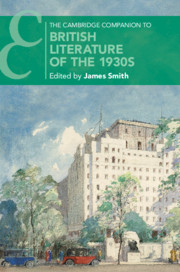Book contents
- The Cambridge Companion to British Literature of the 1930s
- The Cambridge Companion to British Literature of the 1930s
- Copyright page
- Contents
- Notes on Contributors
- Introduction
- Chapter 1 Poetry
- Chapter 2 The Literary Novel
- Chapter 3 Drama
- Chapter 4 Publishing and Periodicals
- Chapter 5 The Middlebrow and Popular
- Chapter 6 Modernism
- Chapter 7 Communism and the Working Class
- Chapter 8 Empire
- Chapter 9 Travel
- Chapter 10 The Regional and the Rural
- Chapter 11 The Queer 1930s
- Chapter 12 Remembering and Imagining War
- Chapter 13 Fascism and Anti-Fascism
- Chapter 14 Fashioning the 1930s
- Index
- Cambridge Companions to …
Chapter 7 - Communism and the Working Class
Published online by Cambridge University Press: 18 December 2019
- The Cambridge Companion to British Literature of the 1930s
- The Cambridge Companion to British Literature of the 1930s
- Copyright page
- Contents
- Notes on Contributors
- Introduction
- Chapter 1 Poetry
- Chapter 2 The Literary Novel
- Chapter 3 Drama
- Chapter 4 Publishing and Periodicals
- Chapter 5 The Middlebrow and Popular
- Chapter 6 Modernism
- Chapter 7 Communism and the Working Class
- Chapter 8 Empire
- Chapter 9 Travel
- Chapter 10 The Regional and the Rural
- Chapter 11 The Queer 1930s
- Chapter 12 Remembering and Imagining War
- Chapter 13 Fascism and Anti-Fascism
- Chapter 14 Fashioning the 1930s
- Index
- Cambridge Companions to …
Summary
In 1940, George Orwell wrote a profile of the novelist Henry Miller, praising him as a prose-stylist and psychologist of the ‘ordinary man’, praising him above all as a ‘creative writer’ in what has ceased to be ‘a writer’s world’. For ‘what is quite obviously happening’, Orwell declared, ‘is the break-up of laissez faire capitalism’, ‘the destruction of liberalism’ and of ‘literature as we know it’. In this end-times scenario, Miller is shown clinging to the ‘melting iceberg’ of liberal humanism, elaborating his own ‘subjective truth’ in his own inimitable style, indifferent to the world. As a foil, Orwell introduces the communist ‘propagandists’ and ‘cocksure partisans’ of the next generation.
- Type
- Chapter
- Information
- The Cambridge Companion to British Literature of the 1930s , pp. 113 - 127Publisher: Cambridge University PressPrint publication year: 2019
- 13
- Cited by

